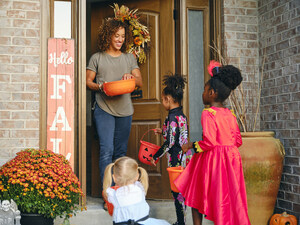
ASHA Offers Helpful Strategies as Families Prepare To Gather Together
ROCKVILLE, Md., Nov. 18, 2025 /PRNewswire/ -- The holiday season is meant to be a joyous time, but for families who have a loved one living with dementia, it can also be an unsettling one.
With Thanksgiving and other holiday gatherings fast approaching, the American Speech-Language-Hearing Association (ASHA) is sharing information and simple strategies that can help to create a meaningful and comfortable space for everyone involved—including and especially those loved ones with dementia.
Understanding Dementia
Dementia affects communication, thinking, and behavior. Changes in any of these areas vary based on the stage of dementia and significantly impact daily life and functioning.
Although many people may be familiar with memory problems, they may not know how dementia can affect communication. People with dementia may experience changes in everyday conversation that include the following:
- having trouble finding the right words
- mixing up words
- losing their train of thought
- struggling to follow or stay on topic
- misunderstanding what others say
"Communication is how we connect with others, and connection is what the holidays are all about," says ASHA 2025 President Bernadette Mayfield-Clarke, PhD, CCC-SLP. "By modifying how you approach a loved one who is dealing with the disease, family and friends can communicate more effectively and have more fulfilling time together."
Helpful Tips and Strategies
With some planning and supportive strategies, ASHA stresses, everyone can maximize the success of holiday gatherings.
For Care Partners
Care partners have a lot to deal with during the holidays. Most likely, they will need to provide extra support to their loved one with dementia if there are changes to their typical routine or environment.
Additionally, care partners may find themselves managing the emotions of visitors who are surprised or upset by the changes they are seeing. The steps below can help.
- Set expectations ahead of time for visitors. Let guests know what to expect. Explain changes so they can approach their loved one with patience and understanding. Stress that they shouldn't take these changes personally, including if the person doesn't remember them. Remind family members that the disease has caused these changes—and that the changes aren't a reflection of the family member's relationship with that person.
- Help prepare the person who is living with dementia. Talk about who will be coming in the days and weeks ahead of time. Share pictures of them, and label those photos with their names and relationships to the person. Write out a simple schedule—and practice it.
- Try to keep routines as consistent as possible. This may be challenging, but consistency in daytime and evening routines will help minimize additional confusion and frustration.
- Limit overstimulation. A noisy environment and having a lot of people around can be overwhelming and even scary for a person who has dementia. Try to reduce background noise, and avoid cramming a lot of people into a small space.
- Seek additional help. Talk to professionals on your loved one's care team about how to better manage this time. Reach out to their speech-language pathologist, social worker, and nurse. Connect with resources such as the National Caregiver Help Desk, the national 211 hotline, and local aging and health agencies.
For Extended Family and Friends
Relatives and other visitors can help care partners by being flexible and understanding that the holidays may not look the same as they have in the past.
Also, they can offer to help the primary care partner in concrete ways—not just on holidays but in general. For example, rather than saying "What can I do to help?", offer a list of three very specific ways that you're prepared to assist them. For example, going to the grocery store; cooking specific dishes; or staying with the person during a certain time window to give the care partner a break.
When it comes to interacting and communicating with a loved one with dementia, family and friends can use these strategies:
- Create calm conversations. Approach the person from the front. Use their name—not familial names—because they may not recognize themselves as "grandma" or "uncle" any longer. Keep your tone friendly.
- Simplify communication. Speak slowly, and use shorter sentences, providing one idea or direction at a time.
- Address them as you would another adult. Don't "talk down" to the person, and don't speak to them as you would a child.
- Allow extra time for responses. Pause, and give them added time to process what you're saying.
- Live in their reality. It's more important to stay connected than to stay accurate. Say, "Tell me about that" instead of arguing or correcting them. Validate their feelings ("You sound worried") even if you don't understand or agree.
- Show—don't quiz. Avoid asking "Do you remember . . . ?" questions. Instead, share a short story or photo, and offer simple comments like "This was your garden last summer."
- Talk about familiar topics. Discussing their favorite foods/recipes, music, or shows can spark conversation and connection.
- Engage the senses. Play music, and sing holiday songs that they love. Offer favorite holiday foods and drinks. Have familiar scents that spark holiday feelings and nostalgia.
- Offer choices instead of open-ended questions. For example, ask, "Would you like stuffing or mashed potatoes?" instead of "What side dishes do you want?"
- Use supportive nonverbal communication. Stay at their physical level when talking (if they're sitting, sit down and address them at eye level). Maintain eye contact, smile, and provide gentle touch when it seems welcome.
- Handle repetition kindly. Rather than saying, "You just told me that," redirect them gently to a new topic.
Preparing Children for Changes
Children may not understand why someone they love behaves differently. These tips can help them feel more comfortable:
- Explain dementia in simple terms. Use brief, simple language like "Grandpa's brain works differently now, so he may forget things or need extra help, but he still loves us."
- Model how to interact. Show kids how to say hello, speak clearly, and be patient. You might say, "Let's give Grandma a little extra time to answer."
- Practice what to say. Give kids simple phrases that they can use if they feel unsure, like "Hi! I'm your granddaughter, Lily" or "It's okay—I can help you."
- Prepare them for possible behavior changes. Explain to them ahead of time that their loved one may repeat questions, get confused, or say something unexpected. Emphasize that the person isn't doing this on purpose. Reassure the child that no one is upset with them.
- Offer ways to connect. Suggest easy activities that the child and the person with dementia can do together—like looking at family photos, drawing together, listening to music, or helping set the table. Familiar and hands-on tasks can be comforting.
- Make space for feelings. Let kids know it's okay to feel sad, confused, or even uncomfortable. Encourage them to take breaks if necessary.
If you have questions about dementia and communication support, a speech-language pathologist can help. To find one in your area, visit ASHA's directory of professionals, ASHA ProFind: https://www.asha.org/profind/.
About the American Speech-Language-Hearing Association (ASHA)
ASHA is the national professional, scientific, and credentialing association for 241,000 members, certificate holders, and affiliates who are audiologists; speech-language pathologists; speech, language, and hearing scientists; audiology and speech-language pathology assistants; and students. Audiologists specialize in preventing and assessing hearing and balance disorders as well as providing audiologic treatment, including hearing aids. Speech-language pathologists (SLPs) identify, assess, and treat speech, language, and swallowing disorders. www.asha.org
CONTACT: Francine Pierson, 301-296-8715, [email protected]
SOURCE American Speech-Language-Hearing Association (ASHA)





Share this article